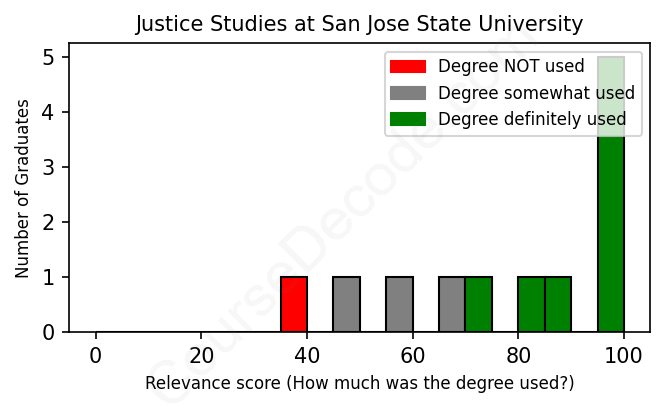
First, some facts. Of the Justice Studies graduates from San Jose State University we've analyzed , here's how many have used (or NOT used) their degree in their career:

These are estimates based on AI analysis of 12 LinkedIn profiles (see below).
The verdict? Above average. Overall, with an average relevance score of 77%, Justice Studies graduates from San Jose State University have a higher likelihood (+10%) of finding work in this field compared to the average graduate across all fields:
And for comparison, here's the chart for all profiles we've looked at across all degrees.
Also, after graduating, only 25% of these graduates have pursued further education other than another Bachelor's degree (such as a Masters degree or other), compared to the average across all profiles of 35%. This suggests a Bachelors degree is enough for most Justice Studies graduates, and it's normal to look for work straight after graduation.
See the details:
|
Relevance score: 56% We think this person has gone into a career only somewhat relevant to their degree. We think this person has gone into a career only somewhat relevant to their degree.
DEGREE INFOGraduated in 2023 from San Jose State University with a Bachelor's degree in Justice Studies. No other secondary education since. JOB HISTORY SINCE GRADUATIONIntern Center of Employment Opportunities Jan 2023 - Apr 2023 Afterschool Leader  YMCA of Silicon Valley Jan 2023 - Feb 2024 Outreach Specialist  HomeFirst Feb 2024 - Present ABOUTI recently received my Bachelor's degree in Justice Studies at San Jose State University, where I learned about the criminal justice system, social justice issues, and human rights. My mission is to apply my education and skills to create positive change in my community and beyond. I am passionate about learning, helping others, and advocating for justice. |
The top 10 most common jobs done by the graduates we've analyzed (ranked most common to least) are:
When looking at the career paths of graduates from San Jose State University with a degree in Justice Studies, it's clear that many have gravitated toward roles in public administration, therapy, and legal services. Positions like the Management Analyst and Administrative Analyst at the City of Fremont show a significant alignment with governmental processes and policy analysis, which directly relate to the core principles learned in Justice Studies. Other roles, such as Mental Health Therapist and Family Counselor, also highlight a strong connection, indicating that graduates are applying their knowledge about social systems and justice in real-world settings, especially concerning family dynamics and youth interventions.
However, not all paths are directly related to the Justice Studies field. Several graduates have taken positions in human resources or operational roles that, while they may involve some organizational skills or policy understanding, do not require specialized knowledge from their degree. For instance, jobs like Talent Coordinator or Information Specialist do not actively utilize justice-related skills. Overall, while many graduates find relevant positions that leverage their education, others tend to end up in roles where their degree's specifics aren't fully applied, demonstrating a mixed bag of outcomes for those entering the workforce after studying Justice Studies.
Here is a visual representation of the most common words in job titles for Justice Studies graduates (this is across all Justice Studies graduates we've analyzed, not just those who went to San Jose State University):

When you look at the career paths of graduates with a Justice Studies degree from San Jose State University, it’s interesting to see both the variety and some common trends over time. Right out of college, many of them landed jobs in supportive or administrative roles within organizations that seem somewhat aligned with their degree—like working at youth services, mental health facilities, or in local government roles. So, if you’re graduating soon, you can expect to start in roles that often help you build up your skills and experience in the justice or social services fields, like administrative positions or direct service jobs.
Fast forward five to ten years, though, and you'll notice a mixed bag. Some alumni have progressed into more specialized roles—like becoming family counselors or management analysts in city government—showing that a solid foundation in Justice Studies can definitely lead to meaningful careers. On the other hand, there are also graduates who ended up in jobs that aren’t directly related to their degree at all, like being tutors or working as office assistants. This suggests that while a degree can offer pathways to rewarding careers, the journey can vary widely, and some might find themselves in roles that they didn’t originally envision after graduating. Overall, it’s clear that the degree can be beneficial, but personal interests and opportunities play a big role too!
Honestly, a Bachelor’s degree in Justice Studies, like the one at San Jose State University, tends to fall somewhere around the average in terms of difficulty. It’s not a walk in the park, but it’s also not the most intense program out there. You’ll be diving into topics like law, ethics, and social justice, which can definitely get deep and thought-provoking. If you’re someone who enjoys reading, writing papers, and discussing complex issues, you might find it pretty manageable. Just be ready to stay on top of your assignments and engage with the material, and you should be fine!
Most commonly, in the LinkedIn profiles we've looked at, it takes people 2 years to finish a Bachelor degree in Justice Studies.
Looking at these Justice Studies grads from San Jose State University, it seems like they’ve had a mixed bag when it comes to making decent money. Some of them started with solid roles, like a Supervisor of Operations and a Management Analyst, which likely paid pretty well, especially in the public sector and tech. Others seem to have hopped around to positions like tutors and interns, which definitely don't pay much, especially early on in their careers. Over time, many moved into more stable roles, especially in government or mental health services, where they could have a more reliable income. So, while some are probably making a decent living now, others may have had a tougher time financially early on, which is pretty common when you're starting out in any field.
Here is a visual representation of the most common words seen in the "about" section of LinkedIn profiles who have a Bachelor degree in Justice Studies (this is across all Justice Studies graduates we've analyzed, not just those who went to San Jose State University). This may or may not be useful:

Here are all colleges offering a Bachelor degree in Justice Studies (ordered by the average relevance score of their Justice Studies graduates, best to worst) where we have analyzed at least 10 of their graduates:
| College | Score | Count |
|---|---|---|
 San Jose State University San Jose State University
|
77 | 12 |
 James Madison University James Madison University
|
62 | 14 |
 Arizona State University Arizona State University
|
58 | 11 |